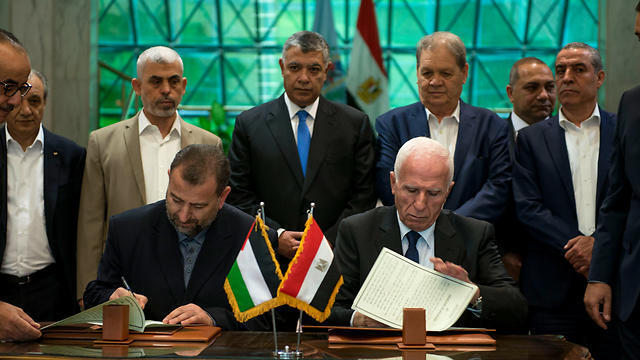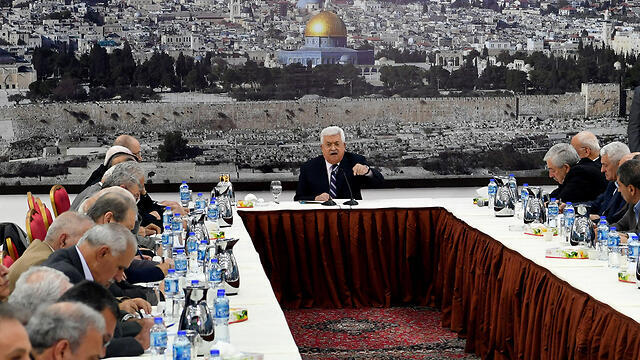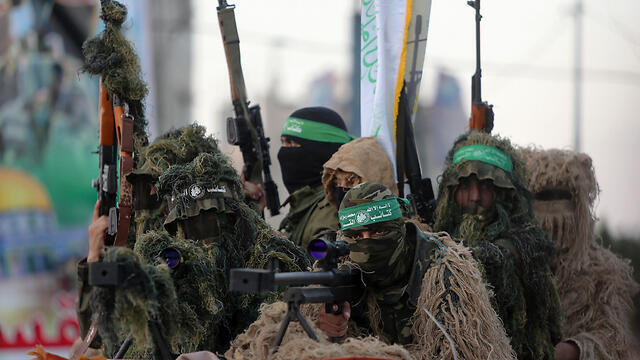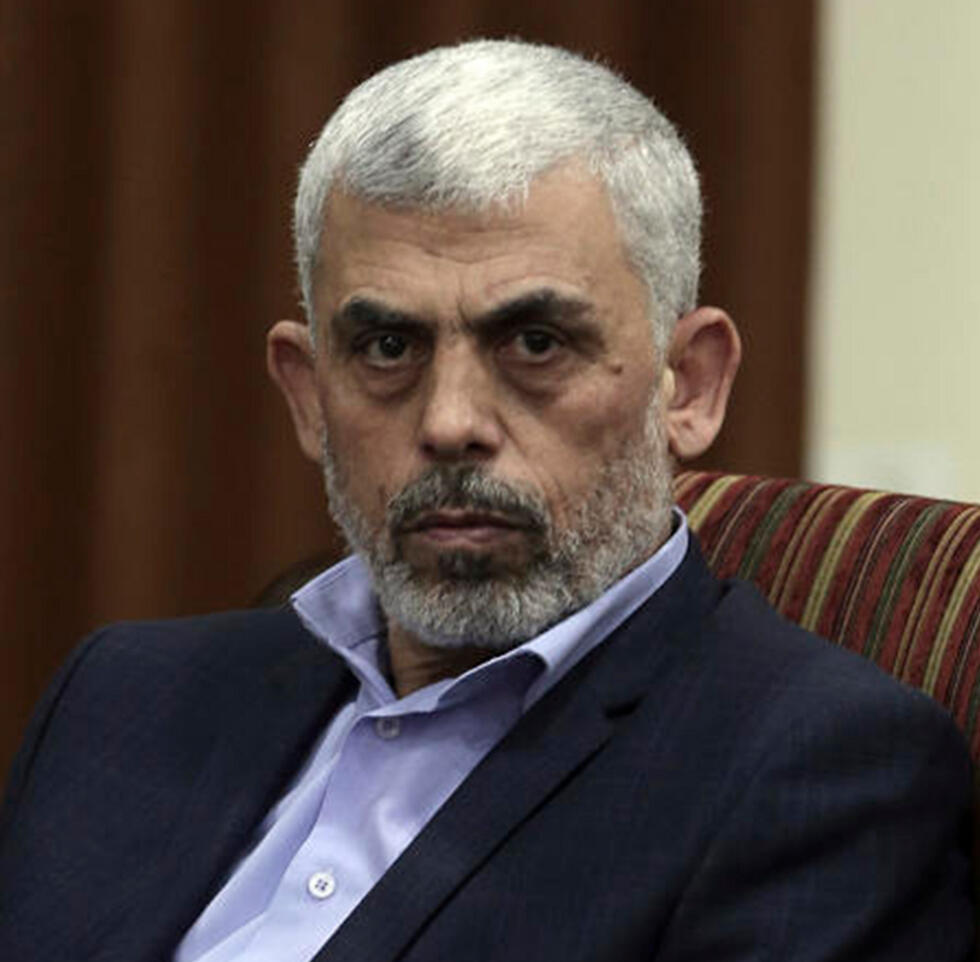Getting your Trinity Audio player ready...
When Fatah and Hamas signed a reconciliation agreement in Cairo about six months ago (one of many reconciliation agreements in the past decade), there was a lot of skepticism among many elements—Palestinian, Israeli, Arab and international—as to the chances of its success.
It was simple logic: Egypt managed to get the bitter rivals in one room, but demanded that they avoid discussing the biggest obstacle—handing the security control over the Gaza Strip to the Palestinian Authority and disarming the military wings.
So the organizations’ leaders sat around one table in Cairo and then in Gaza, shook hands, raised them in the air with a big smile, posed for photographs and promised that this time it’s for real, that this time it will work out. But the elephant in the room was big, too big.
It took Palestinian President Mahmoud Abbas only several days to declare from every stage that the Hezbollah model in Lebanon would not be duplicated in the Gaza Strip. Different Palestinian officials asserted in closed briefings that not a single worker in Hamas’ security apparatuses would be incorporated into the Palestinian security apparatuses.
Hamas, for its part, presented a very simple model: Anything above the ground would be under the Palestinian government’s responsibility, and anything underground would be under Hamas’ responsibility. Make no mistake—the word “underground” doesn’t refer to the tunnels alone, but to everything that has to do with the organization’s military wing, the Izz al-Din al-Qassam Brigades.
4 View gallery


Hamas and Fatah representatives sign the reconciliation agreement in Cairo in October 2017
(צילום: EPA)
From this point, it was already clear that a full reconciliation would not be reached, but the optimists believed there would be a partial reconciliation. Some referred to it as “a 30-percent reconciliation.”
But plans are one thing, and reality is another thing. Hamas did hand the control over the crossings to the PA, dismantle its front posts near the Erez and Karni crossings and give the PA control over the Rafah Crossing (which remained almost permanently closed), and the Palestinian government ministers in Ramallah did receive control over their ministries in Gaza, at least on paper—but that’s more or less where it ended.
Signs of escalation
Many believed that from this point, the reconciliation process would slowly die down, but then two explosions occurred: A physical explosion in the form of a roadside bomb that was detonated near Palestinian Prime Minister Rami Hamdallah’s convoy, and the second explosion in the form of Abbas’ verbal attack on Hamas at a Palestinian leadership meeting in Ramallah.
Not only has Abbas failed to lift most of the sanctions he imposed on the strip before the reconciliation agreement, but last week he even announced he would step up the measures against Gaza and Hamas. Further sanctions in the current unstable situation in the Gaza Strip will clearly deepen the crisis and the civilians’ distress. Ending the reconciliation agreement on a violent note is bad news for the Palestinians, but for Israel too.
Why does it concern us? Past experience shows that when Hamas detects growing civilian unrest in Gaza which could lead to civil disobedience, it tends to divert the fire towards Israel. This could happen in the form of a new escalation or an attempt to surprise Israel with a significant attack or, alternatively, by giving thousands of Gazans the green light to march towards the Israeli border, thereby pushing the IDF into a corner in which any response would harm Israel. Such a march is already around the corner and is expected to take place sometime between Land Day and Nakba Day.
Signs of escalation have begun both in Gaza and in the West Bank and east Jerusalem, with different terror attacks carried out in recent weeks in both areas: Shooting, car-ramming and stabbing attacks in the West Bank and in Jerusalem, and improvised explosive devices planted on the Gaza border.
As for indications that the reconciliation process is over, here’s a fresh example: Last week, the morning after Abbas’ fiery speech against Hamas, the organization’s security personnel arrived at a compound that used to serve as Hamas’ front post before the Erez crossing, for the first time since Hamas handed control of the crossing over to the PA. They got on a bus that was about to leave from the strip to the Allenby Crossing through Israel and checked every single passenger, before letting the bus hit the road.
Yahya Sinwar, the Hamas leader in Gaza, had pushed for a reconciliation with Fatah more than anyone else in the organization. But following the dissolvement of the agreement in the past month, Sanwar has practically disappeared from the public stage.
Last week, he was supposed to host the Palestinian factions in his office for a discussion on the state of the reconciliation process. The meeting was held in his office, but he didn’t show up. He was replaced by his deputy, Khalil al-Hayya. Does Sinwar’s disappearance have to do with the harsh disagreements with the Hamas leadership on how to deal with Fatah? That’s unclear at the moment, but these things are likely related.
Palestinian-American rift
Last week, Abbas also slammed US Ambassador to Israel David Friedman as a “son of a dog,” but that was a minor part of his speech, which was dedicated almost exclusively to attacking Hamas. The curse may have made headlines, but it doesn’t change the given situation between Ramallah and the current American administration since President Donald Trump recognized Jerusalem as Israel’s capital—a complete rift which likely won’t be mended as long as the current administration is in power and as long as Abbas remains in his seat.
Abbas is in a state of distress and has no real support from the Arab countries or from the European Union. He feels lonely, he has a very short fuse, he is aging and his health isn’t getting any better. The Abbas doctrine has failed, and he has been unsuccessful in giving his people a state. For all these reasons, he doesn’t mind using less diplomatic language and speaking his mind.
The ramifications of this curse as far as Israel is concerned, however, are insignificant compared to the ramifications we may be forced to deal with if Abbas’ sanctions on Gaza bring the strip to the brink of collapse. It is therefore more important to focus on the Gaza issue than on the “son of a dog” or “may your house come to ruin” curses.




